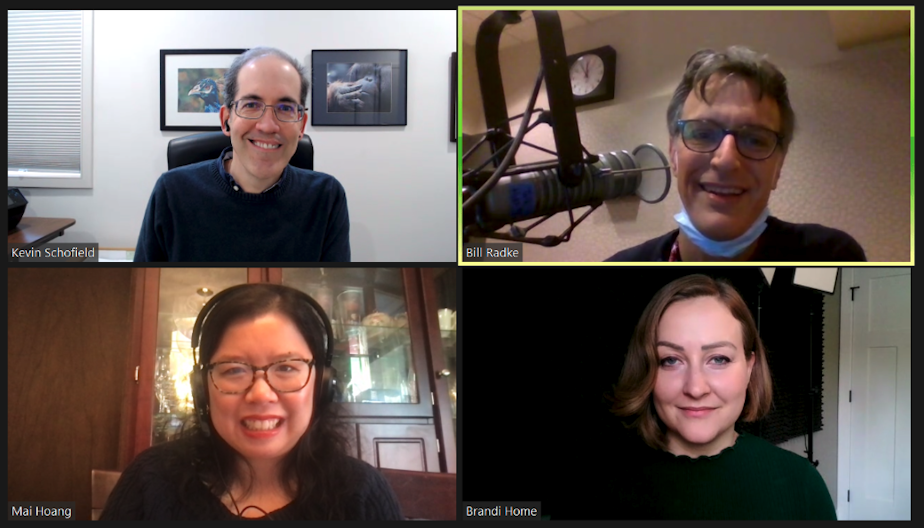The election, vaccines for kids, and apples, this week

Bill Radke discusses the week's news with Seattle City Council Insight's Kevin Schofield, FOX 13's Brandi Kruse, and Crosscut's Mai Hoang.
After a year of polarizing campaigns, this year’s election finally took place. Candidates have hawked their positions on key issues of homelessness, policing, and pandemic recovery for months. So what were the results? In the most high profile local races, Bruce Harrell is set to be Seattle's next mayor and Ann Davison the Seattle City Attorney. How have results compared with the primaries? Surprises? Looking at endorsements, strong championings from typical sources resulted in a mixed bag. Candidates by the Seattle Times Editorial Board fared well, while progressive candidates endorsed by Congressmember Pramila Jayapal fell more flat (as did those endorsed by The Stranger). What did this election tell us about the efficacy of endorsements? Do they still mean something, and to who? When it came to advisory votes, voters are strongly rejecting Advisory Vote No. 37, which established a statewide capital gains tax. What’s the explanation for the lean toward repealing? What does this mean for future tax initiatives?
There's lots to talk about with the election, so we dive this week into three main questions: what happened, who is affected, and what message did this election send?
Plus, elections didn’t just happen in Seattle this week. Cities east of the cascades saw their fair share of election drama and surprises as well. In Yakima, voters overwhelmingly supported a local income tax ban, as well as a meeting requirement for Yakima City Council members. And they’re not alone -- one county and ten other cities have passed similar income bans. Longview’s city council banned the tax in October, saying in their summary that “The imposition of a local income tax on the businesses and residents of the City of Longview is prohibited. Such a tax would be in direct conflict with the high value the City places on promoting economic development through the attraction and expansion of financially healthy, family wage paying employers. Small businesses are the backbone of our local, regional, state, and national economy and it is imperative that the City not put unnecessary hurdles in the way of their success. As such, the Longview City Council prohibits the imposition of a local income tax in the event a local income tax is determined legal and permissible by the Washington State Supreme Court or the Washington State Legislature.” But one tax did pass in Yakima County -- voters overwhelmingly supported a permanent sales tax for law and justice services. Were any of these results surprising? Or was this status quo for east of the cascades? Who will be impacted by these results? Will these income tax bans matter if a statewide income tax makes it through the courts? And please tell us more about the city council member that was the impetus for this Yakima meeting requirement. Why did he miss so many? Does he just not like meetings?
In other news, COVID vaccines were approved for kids 5-11. King County is working hard on a rollout plan, and it’s set to be very different from adult vaccination. Vaccine centers will be primarily based in pediatrician offices, pharmacies, and in schools. What impact will this have on the pandemic? What is the county’s reasoning for changing up the vaccine rollout? How will this impact herd immunity? In other vaccine news, City of Seattle employees and departments are voicing their concern with staffing shortages caused by the vaccine mandate. The Seattle Fire Department has met its obligations to staff events around the city with voluntary overtime (about 11,000 hours a week of overtime). Similar complaints have been heard from SPOG (Seattle Police Officers Guild), which is pushing against the mandate through an Unfair Labor Practice complaint. This asserts that the city did not allow proper bargaining when it decided on the mandate process. How are mandate shortages affecting the city? Is there any wiggle room in the mandate for special circumstances? Any expected changes to the mandate as we weather these shortages?
Lastly, have you missed cosmic crisp apples since they went out of season? Well then get ready to head to the grocery store, because the Washington apple starts shipping nationally on Nov. 8. Cosmic Crisp is stored for flavor development for several weeks before they go to stores. And Washington apple growers are banking on its success. Some farmers have invested millions in the fruit, and with the last two seasons stymied by the pandemic, there’s hope that this will be the Cosmic Crips’ year. There’s also hope that the new variety will boost interest in apples as a whole. Apple consumption is dropping, and has been for some time. How big of an impact would it have on Washington’s economy if the variety doesn’t take off? How important are apples to Washington’s agriculture sector? What else do we need to know about cosmic crisps, and apples in general? Will you be buying some cosmic crisp apples? Or are you more a fan of another variety?






